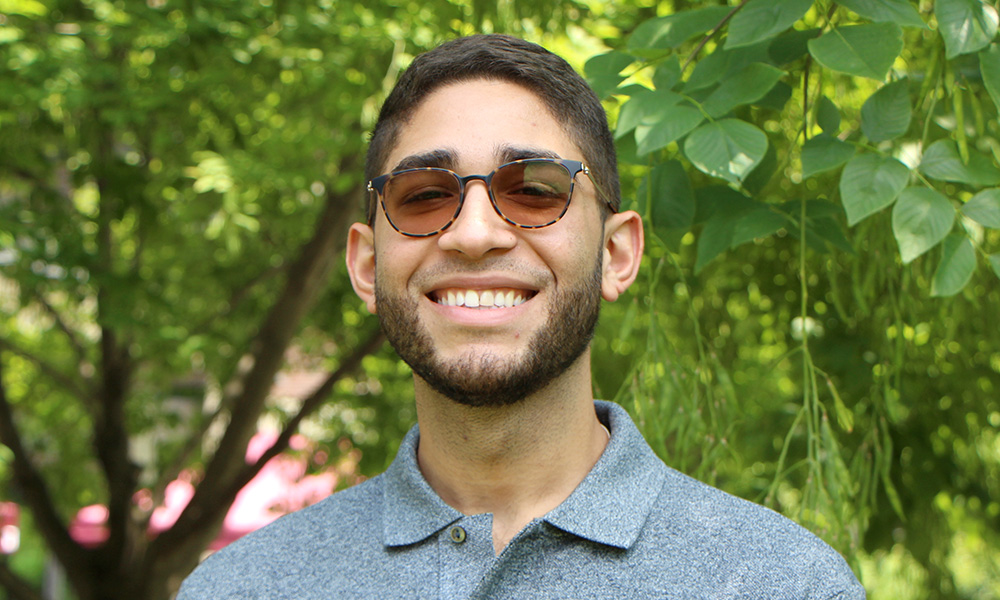MCO graduate student Carlos Rivera-López (G2, Srivastava Lab) recently joined the Srivastava Lab, where he will study stem cells that enable regeneration in an aquatic worm called Hofstenia miamia. He is also co-leading the Summer Research Opportunities at Harvard (SROH) program and hosts a website called Latinx in STEM, which features an extensive list of resources for Latinx students interested in pursuing graduate school.
Networking and building communities around science have always been important to Rivera-López. Growing up in Orocovis in the mountainous, forested region of central Puerto Rico, he was interested in animals and evolution. Although supportive, few of his family and friends were in STEM fields, so Rivera-López began his scientific networking efforts early through participating in school science fairs.
“Starting from middle school all the way through high school, I was gradually increasing my exposure to science, and it was in high school that I was able to acquire experience doing molecular research and also presenting it,” he says.
As an undergraduate at University of Puerto Rico Mayagüez, Rivera-López joined Juan Carlos Martinez-Cruzado’s lab and helped to annotate the genome of the critically endangered Puerto Rican Parrot, the last surviving parrot species in US territory. “”Conservation requires not only close attention to how the bird is growing—Is it safe? Is it healthy?—but also requires some strategic breeding between them,” Rivera-López says. “Analyzing and learning from the genome can also aid in the parrot’s conservation,”
Rivera-López wanted to gain more experience in different fields within biology, so, in 2018, he applied and was accepted to the SROH program, as one of seven student interns in the cohort.
For his SROH internship, Rivera-López joined Christina Woo’s lab in CCB. His summer research on an enzyme called O-GlcNAc Transferase contrasted sharply with his parrot research. “It provided me with a way of getting out of the field I was in—a more evolutionary bioinformatics—and allowed me to experiment with chemistry,” he says. “Through the SROH, I was able to explore and expand my horizons, tackling other fields…and I think that is a very MCO-specific feature.”
The variety of research topics explored by MCB labs drew Rivera-López to Harvard, both for SROH and later for grad school. The MCO program is administered through the MCB department, but many MCO students conduct their research in labs based in other departments, such as OEB (Organismal and Evolutionary Biology), CCB (Chemistry and Chemical Biology), HSCRB (Stem Cell and Regenerative Biology), Physics, or SEAS (School of Engineering and Applied Sciences). They also have the option of working jointly with labs at Harvard Medical School or the Broad Institute. (In turn, graduate students from other Harvard graduate programs, such as Biophysics or Systems Biology, often work in MCB labs.)
After SROH, Rivera-López returned to UPR Mayagüez confident that he wanted to pursue a research career. As he worked to finish his degree, many of his colleagues would send him links to graduate programs, funding opportunities, and advice on how to prepare application materials. “I initially wanted to figure out a way for myself to file all those resources in an organized way,” he recalls. “But later on, I realized that having all of those resources compiled, I was able to make them available for my fellow aspiring scientists in Puerto Rico.”
The collection of links and resources became the basis for Rivera-López’s website Latinx in STEM. The site explains the distinctions between personal statements, research statements, and statements of purpose and includes information on scholarships, research experiences for undergraduates, conferences, and graduate programs—as well as contact information for Rivera-López. He often talks with students who have follow-up questions and gives feedback on application materials.
Rivera-López feels it’s important to include resources that are tailored for Latinx students and aspiring scientists from Puerto Rico in particular. “In the past couple of years, Puerto Rico has been subjected to many political and economic changes, as well as natural disasters like hurricanes and earthquakes,” he explains. These disasters have left resources for conducting STEM research in Puerto Rico stretched thin, resulting in fewer local opportunities for students. So, he adds, it’s important for Puerto Rican students to know that there are resources specifically earmarked for them.
Meanwhile in the Srivastava Lab, Rivera-López is gearing up for qualifying exams. His thesis research will focus on a group of stem cells called neoblasts and how their dynamics, such as gene expression and cell growth, change during regeneration. “These cells are the only cells that proliferate in the worm, so whenever there is an injury occurring, neoblasts are able to differentiate into all cell types and jumpstart the regeneration process,” he says.
“Integrative biology is powerful–we learn more if we pose important questions and then apply the best approaches, no matter which field of biology they come from, to answer those questions,” says OEB faculty and Rivera-López’s adviser Mansi Srivastava. “MCO students bring a strong training in molecular and cellular approaches to answer major questions about organismal and evolutionary biology in my lab. The pluripotent stem cells Carlos is studying are also present in many distantly-related animal species, and Carlos’ work will allow us to learn more about the evolution of this fascinating cell type.”
After beginning grad school in a virtual format, Rivera-López is enthusiastic about the upcoming year. “In the spring semester, we were still taking classes online, but we were able to rotate through labs in person, which I am super-thankful for,” he says, adding that he’s looking forward to returning to in-person classrooms as a TA for SCRB111: “Regeneration: Phenomena to Mechanisms” and impromptu hallway conversations this fall.


